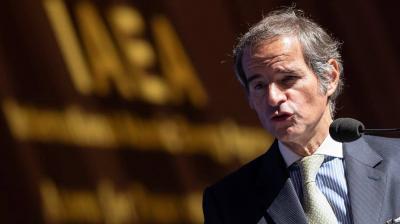As negotiators anticipate returning to the Austrian capital, Vienna, to continue discussions regarding Iran's nuclear program, the Director of the International Atomic Energy Agency (IAEA), Rafael Grossi, stated that without Tehran's commitment and cooperation from all parties, there will be no agreement. He added in an interview with Al Arabiya/Al Hadath on Saturday that the more discussions take place, the lower the conflict becomes, and the closer the viewpoints align.
Grossi clarified that the IAEA is intensifying efforts to support reaching an agreement and ensuring its implementation and adherence, noting that the talks are progressing in the right direction despite the challenging circumstances.
He indicated that reaching an agreement in the coming days is a complex matter, but not impossible, and asserted that the upcoming days will clarify the outcome of the ongoing efforts. He observed that, so far, no agreement has been reached regarding Iran's nuclear program, but hope has not been lost, adding that "difficulties persist, and we must work to resolve them one by one." He emphasized the need to closely monitor the situation and exercise patience to achieve a diplomatic solution, calling for Iran's cooperation.
Grossi further explained that "the current political discussion centers on what the negotiating parties want," asserting that "the most important question is whether a return to the 2015 nuclear agreement is possible." He also expressed concern regarding the presence of undisclosed nuclear materials at Iranian sites. He urged Iran to cooperate and respond to the agency's inquiries and allow full access to monitoring devices at Iranian nuclear facilities, stating that without the commitment of Iranian authorities and cooperation from all parties, there will be no agreement.
It is worth noting that the United States, along with diplomats from Western countries (France, Britain, Germany, Russia, and China), are participating in negotiations that began their eighth round in December 2021. They have repeatedly warned Tehran about the time running out and confirmed that the coming weeks will be crucial for reviving the agreement from which the previous U.S. administration, led by Donald Trump, withdrew in 2018. They indicated that mid-February 2022 could be a deadline for attempts to revive the agreement, which limited Iran's nuclear program in exchange for easing sanctions on Tehran. However, Iranian authorities continue to hold on to certain stipulations that pose significant obstacles to reaching a resolution, including demands for guarantees against any future U.S. withdrawal from any new agreement and the lifting of all sanctions imposed on them, particularly those related to terrorism.




